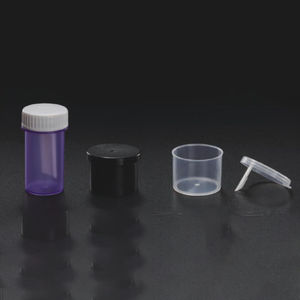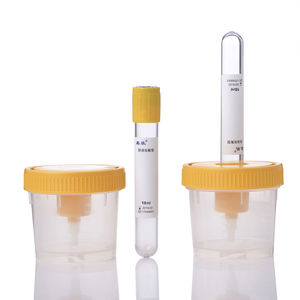
- Company
- Products
- Catalogs
- News & Trends
- Exhibitions
Storage sample container G1 seriestransporturinestool

Add to favorites
Compare this product
Characteristics
- Applications
- storage, transport
- Sample type
- urine, stool
- Other characteristics
- with cap
- Volume
30 ml, 40 ml, 60 ml
(1.01 US fl oz, 1.35 US fl oz, 2.03 US fl oz)
Description
Urine containers play a vital role in accurate sample collection and storage for clinical diagnostics. These specialized containers ensure safe and hygienic handling, preventing contamination and preserving sample integrity for reliable test results. In this article, we delve into the significance of urine containers, discussing their features, benefits, and impact on medical testing. Discover how urine containers contribute to efficient laboratory processes and aid in the diagnosis and monitoring of various medical conditions.
Urine containers are an often overlooked but essential tool in the field of clinical diagnostics. They play a crucial role in the accurate collection and storage of urine samples, ensuring reliable test results and comprehensive patient care. Let's explore the features, benefits, and significance of urine containers, shedding light on their impact in medical testing.
Hygiene and contamination prevention are of paramount importance in any medical testing process, and urine containers address this concern effectively. These specialized containers are designed with tight seals and secure lids, ensuring that samples remain uncontaminated during transportation and storage. With their leak-proof properties, urine containers eliminate the risk of cross-contamination and maintain the integrity of the sample.
Moreover, urine containers offer the advantage of hygienic sample collection. With features such as screw-top lids, snap-on covers, or built-in handles, they minimize direct contact with urine, reducing the risk of exposure to pathogens for both patients and laboratory personnel.
VIDEO
Catalogs
Specimen Container-Hwtai
3 Pages
Related Searches
- Container
- Sample box
- Rack
- Waste container
- Transport container
- Laboratory container
- Storage rack
- Storage sample box
- Sample container with cap
- Transport sample box
- Polypropylene sample box
- Safe container
- Urine sample box
- Benchtop rack
- Sample container with screw cap
- Polypropylene container
- Laboratory sample box
- Polyethylene container
- Biological sample box
- Polyethylene sample box
*Prices are pre-tax. They exclude delivery charges and customs duties and do not include additional charges for installation or activation options. Prices are indicative only and may vary by country, with changes to the cost of raw materials and exchange rates.







